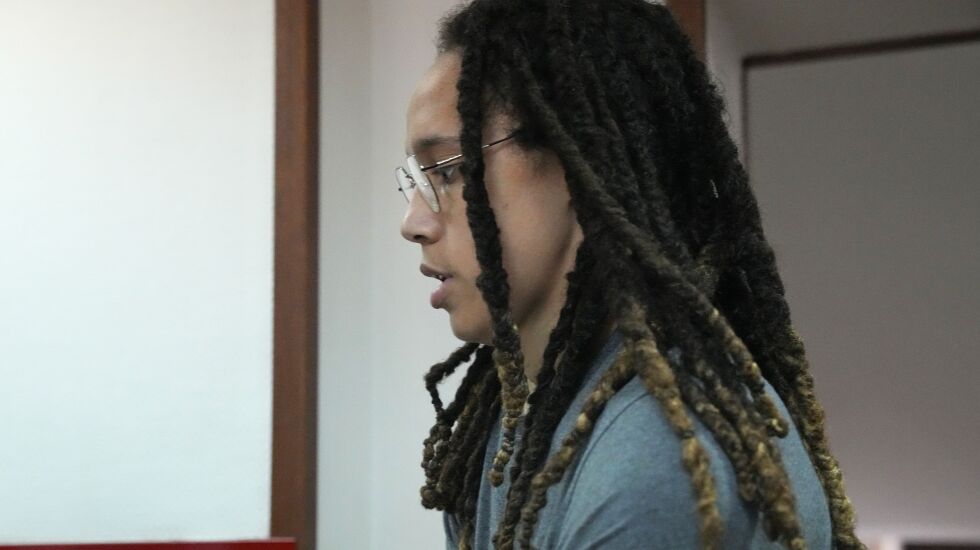
MOSCOW — Shackled and looking wary, WNBA star Brittney Griner was ordered to stand trial Friday by a court near Moscow on cannabis possession charges, about 4 1/2 months after her arrest at an airport while returning to play for a Russian team.
The Phoenix Mercury center and two-time U.S. Olympic gold medalist also was ordered to remain in custody for the duration of her criminal trial. Griner could face 10 years in prison if convicted on charges of large-scale transportation of drugs. Fewer than 1% of defendants in Russian criminal cases are acquitted, and unlike in the U.S., acquittals can be overturned.
At Monday’s closed-door preliminary hearing at the court in the Moscow suburb of Khimki, Griner’s detention was extended for another six months. Photos obtained by The Associated Press showed the 31-year-old in handcuffs and looking straight ahead, unlike a previous court appearance where she kept her head down and covered with a hood.
Her detention and trial come at an extraordinarily low point in Moscow-Washington relations. She was arrested at Sheremetyevo Airport less than a week before Russia sent troops into Ukraine, which aggravated already-high tensions with sweeping sanctions by the United States and Russia’s denunciation of U.S. weapon supplies to Ukraine.
Amid the tensions, Griner’s supporters had taken a low profile in hopes of a quiet resolution, until May, when the State Department reclassified her as wrongfully detained and shifted oversight of her case to its special presidential envoy for hostage affairs — effectively the U.S. government’s chief negotiator.
Griner’s wife, Cherelle, urged President Joe Biden in May to secure her release, calling her “a political pawn.”
Her supporters have encouraged a prisoner swap like the one in April that brought home Marine veteran Trevor Reed in exchange for a Russian pilot convicted of drug trafficking conspiracy.
Russian news media have repeatedly raised speculation that she could be swapped for Russian arms trader Viktor Bout, nicknamed “The Merchant of Death,” who is serving a 25-year sentence on conviction of conspiracy to kill U.S. citizens and providing aid to a terrorist organization.
Russia has agitated for Bout’s release for years. But the discrepancy between Griner’s case — she allegedly was found in possession of vape cartridges containing cannabis oil — and Bout’s global dealings in deadly weapons could make such a swap unpalatable to the U.S.
Others have suggested that she could be traded in tandem with Paul Whelan, a former Marine and security director serving a 16-year sentence on an espionage conviction that the United States has repeatedly described as a set-up.
U.S. Secretary of State Antony Blinken, asked Sunday on CNN whether a joint swap of Griner and Whelan for Bout was being considered, sidestepped the question.
“As a general proposition ... I have got no higher priority than making sure that Americans who are being illegally detained in one way or another around the world come home,” he said. But “I can’t comment in any detail on what we’re doing, except to say this is an absolute priority.”
Any swap would apparently require Griner to first be convicted and sentenced, then apply for a presidential pardon, Maria Yarmush, a lawyer specializing in international civil affairs, told Kremlin-funded TV channel RT.







